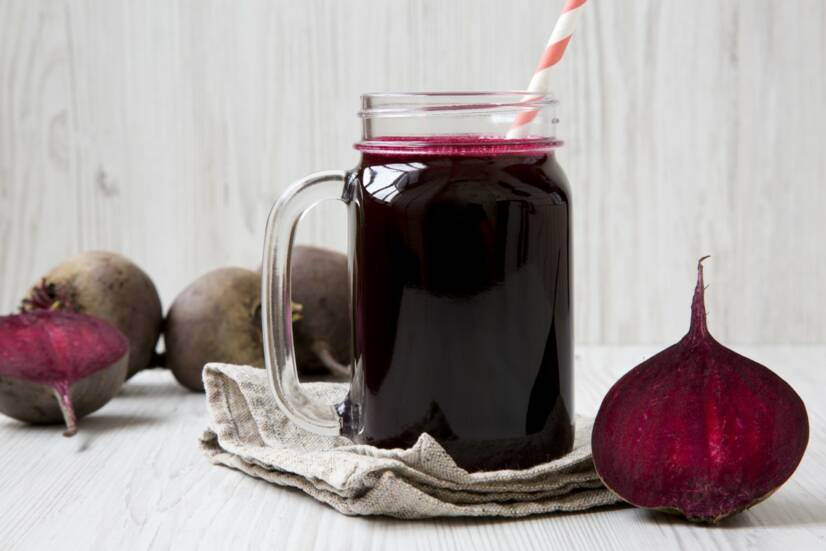- wellplated.com - Beet Smoothie
- healthline.com - 11 Health Benefits of Beet Juice
- healthline.com - 9 Impressive Health Benefits of Beets
Recipe for a healthy beetroot smoothie. Do you know the effects of beetroot?

Yes, even beetroot smoothies are among the recipes that not only have a positive effect on our health, but also on our taste buds.
Article content
The first records of beetroot date back some 3 000 years and date back to Babylonia.
It was known in ancient Rome, where it was used both as food and, more importantly, as medicine.
Thanks to antiquity, it spread throughout Europe.
It has an earthy yet sweet taste that can stand out in a variety of dishes.
It can be used raw, steamed, boiled, baked.
It is a great pity that it is often forgotten in our kitchens.
We can prepare a large number of recipes from it that are not only tasty but have many beneficial effects on our health.
4 positive effects of beetroot on our health
1. Beetroot, like other vegetables, contains a combination of:
- Vitamins C, A, K, D, B vitamins, including riboflavin and folic acid
- minerals - potassium, calcium, magnesium, sodium, iron and manganese
- trace elements - rubidium and caesium
The presence of these substances contributes to a good immune system.
It helps the immune system to function properly.
It has a strong antioxidant effect, i.e. it protects the body against free radicals.
These can damage cells, stimulate the development of many civilisation diseases and also contribute to faster ageing.
Vitamin C also promotes the absorption of iron or the formation of collagen. It adds elasticity and shine to the skin, hair and nails.
Important information for mothers-to-be:
Juice from one beet contains 34% of the recommended daily allowance of folic acid.
Folic acid during pregnancy helps to eliminate birth defects and supports the proper brain development of unborn babies.
2. Beetroot also contains a considerable amount of dietary fibre, which provides our body with:
- nourishment of intestinal bacteria
- the proper functioning of the intestines
- maintains good cholesterol levels
- has a positive effect on defecation
Lack of fibre can result in constipation or other digestive problems.
Warning for those with digestive problems:
This red food can cause bloating, cramping and gas.
3. Beets get their rich color from betaine.
Betaines have:
- anti-cancer effects, which is why beets are one of nature's aids in cancer prevention.
- they are considered free radicals that help find and destroy unstable cells in the body
- betaine also prevents the development of arterial corrosion and supports liver function
- dilates the coronary arteries and strengthens the wall of the hair cells
Did you know...
For atherosclerosis, a treatment is recommended in which you drink raw beetroot juice at a dose of 50-100 ml per day for ten days.
4. Beetroot is a vegetable high in nitrates. Consuming beetroot juice as part of a diet high in nitrates can help us:
- improve blood flow to certain areas of the brain, thereby improving oxygenation
- concentrate and focus
- improve resistance to stress and promote good sleep
- reduce high blood pressure
4x attention!What to remember with beetroot?
- The dye that beetroot contains is responsible for the discolouration of urine and stool after eating it. The discolouration is pinkish and will go away a few days after beetroot is taken off the diet.
- Beetroot contains oxalates, which can be responsible for kidney stones. If you already have them, it is best to avoid eating beetroot.
- As we mentioned, beetroot helps to lower high blood pressure. If you struggle with low blood pressure, beetroot may be a problem for you.
- Beetroot is one of the vegetables with a relatively high glycaemic index. It contains a lot of carbohydrates, namely 10 g in 100 g of beetroot. It is therefore not suitable for those who struggle with fluctuating blood sugar levels.
Recipe for a healthy beetroot smoothie
The healthiest beetroot is raw beetroot. Beetroot smoothies are packed with vitamins as well as fibre.
A large part of the weight of beetroot is water. However, it can also provide the body with a small amount of protein, 1.6 g per 100 g of beetroot.
You may also be interested in our other articles on smoothies:
Smoothie - what it is, how to prepare it and what not to forget
Smoothie recipes - healthy, vegetable, fruit or for weight loss
3orange smoothie recipes
What will we need?
- 1x beetroot
- 1x carrots
- 2x apple
- 200 ml water
- juice of 1/2 lemon
- 1 tablespoon honey
Procedure
- Peel the beetroot, carrot and apple and cut into small cubes. Be precise especially with the beetroot. Beetroot is harder, smaller cubes are better processed into a thick mash by the blender.
- Add lemon juice and water. Depending on how thick you prefer your smoothie, you can add more or less water.
- Blend everything together. The ingredients will combine to create a smooth smoothie.
- Finally, add 1 tablespoon of honey (or more or less to taste) and blend again.
Tips for the end:
Feel free to experiment and add other fruits or vegetables to the beetroot smoothie.
For example, banana or berries are great.
You can also add ginger.
At the end, you can garnish the smoothie with chia seeds.
You can pour the smoothie into a glass bottle and drink it later, for example at work as a snack.
Did you know that...
Beetroot is delicious in spreads, both raw and cooked.
It is also great in salads, whether you like them cold or warm.
It is easy to combine with different vegetables and fruits.
You can use it to make soup (for example borscht) or chips.
It can be used in sweet desserts and as a base for pizza.
The flavour of beetroot will enhance these foods:
- various types of cheese, such as cow, sheep or goat (especially fresh, not aged cheese)
- garlic, horseradish, cabbage, apples, oranges and nuts
- cream, mayonnaise, marinade and yoghurt
- herbs such as fennel fronds, dill, thyme or rosemary (fresh or dried)
We wish you a good taste!
Interesting resources










